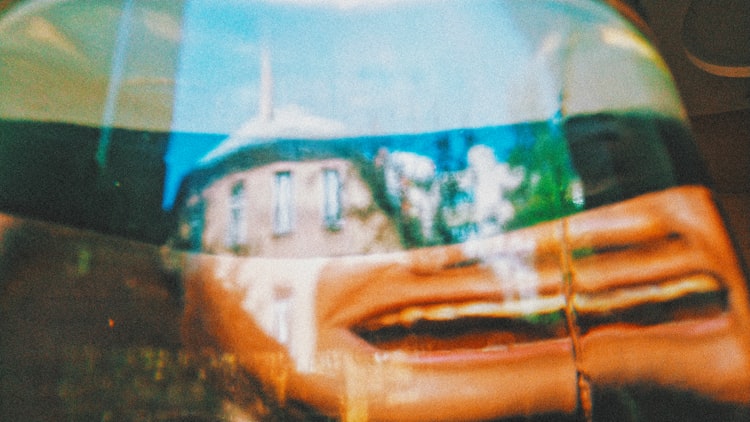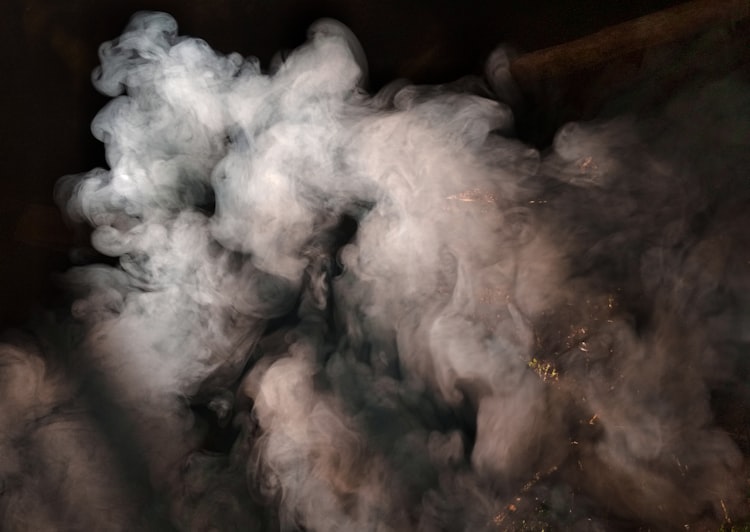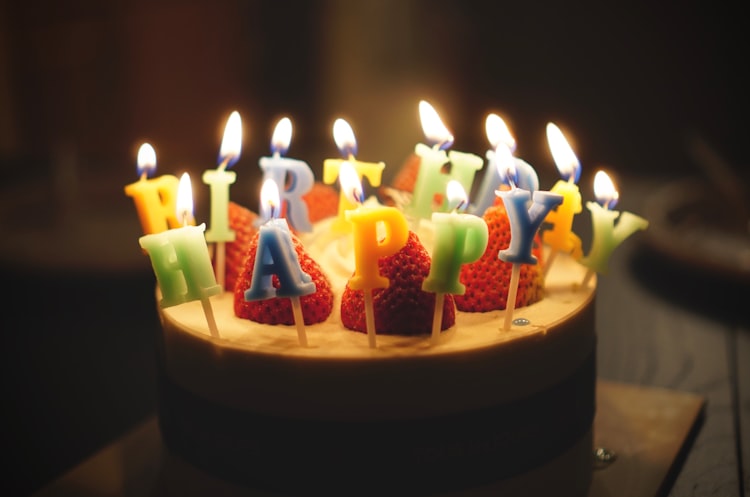His Belly is a Coffin, by Akis Linardos

Content warnings
Anxiety. Paranoia. Alcoholism mention. Domestic abuse mention. Insects. Gore.
Her newborn suckles on her breast as rain leaks from five spots of the thatch roof, collecting on the iron buckets.
Drip. Drip. Drip.
Now that the woman holds something so precious in her arms, the walls seem frail to armor them against the beastly night. The lantana leaves shape crosses on the windows, their only ward—magic to keep the creature at bay.
Drip. Drip. Drip.
Her eyes flicker at the oakwood door, thrashing to the wind. She imagines a squealing cow: gray purpled with bulging veins and large snout to abduct her baby boy whole, cloistered in bovine gums.
The screams of her own mother still echo in the woman’s ears, from when the Lagahoo had taken her sister, and in its place abandoned a dog-faced doll. And if her mother was to be believed, her sister suffers still, as she will for eternity, in the belly of the beast.
Drip. Drip. Drip.
A shuddering thought seizes her: her baby caged by stomach walls. Is this anguish and defenselessness the cost of holding a precious newborn? Is that loud pumping of her own blood and the raging sleeplessness the price of life?
“The lantana leaves will ward us,” she whispers mostly to herself and not her child, eyeing the lantana cross again. “Here we are safe.”
At dawn the woman brews lemongrass tea and callaloo stew, using thickened goat’s milk instead of coconut. There’s fleeting comfort in the redolent vapors.
Her man is a pirate, gone looting but soon to return. She craves the company of someone, anyone at all, even a drunkard like him. A broken shield is better than none.
She hunches over her thatch basket, counting the leftover carrots, turnips and salted pork. Two, three, one. Should last her three nights, then she’ll have to visit the market.
And reveal her newborn to the village.
What if the shapeshifting Lagahoo lurks among their ranks? What if it gets its scent then craves a taste? She couldn’t leave it home alone.
Better do the shopping today. Get it done during Sabbath, when the streets are empty but for the desperate peddlers.
She tucks her baby in a cloth sling, hoists it around her shoulders. Her hand over the cold pommel of the oakwood door, she freezes a moment, sucks a deep breath.
Then exits the house.
Cold wind juggles tumbleweeds over the dirt road, and rabbit’s paws dot the mud. But there is also something else.
Shivers shake her body so hard her baby starts crying.
The woman rushes back in, sings a shaky lullaby and tries hard to forget the image of fresh footprints leading up to her door.
Footprints belonging to no animal she knows, and to no man either, unless there was a man with claws instead of toes.
Her father had once told the woman the Lagahoo can be anything. Anything.
When it’s not hiding, it takes on bovine shape displaying its veins and lungs. The Lagahoo enjoys the feel of cold air on its organs, and it wants to cool the blood pumping its shapeless body, because congealed blood can be molded into anything, like clay. It helps the creature mold itself into a man or woman, dog or cow and even non-living things.
It can be a merchant, and it can be their stall and fruits. It can be the cream inside their sweetened bread, the cherries nesting on their cakes.
It can be the cradle hosting your newborn.
And it maybe was so for her sister, though none witnessed the transition. Maybe the cradle sprouted teeth, maybe the pillow her butt nested on turned into a wet slimy tongue to slide her into the belly of the beast.
Curtains shut, doors locked, the woman won’t visit the market. There’s enough food to get by for another night or two.
And when these nights pass, she hunts the cockroaches and ants and tosses them into the cast iron kettle with oil and salt. The chitinous legs crunch and their entomic fluids suffuse the stew with foul bitterness, but they provide sustenance. Enough to produce milk for her baby.
She won’t reveal it, not to the village men, nor even the women. Not to anyone who could be the Lagahoo wearing human skin.
Moonlight casts slants through the thatch roof, and shines silver upon her beautiful boy. Pale skin, a scattering of blonde hair, and a sprinkle of freckles. So soft, so fragile. So easy to break.
Not if the woman has any say in it. The beast will never touch her sweet babe.
She’ll stay home until her man returns. Drunkard or not, her man can bring vegetables and oxtail home from the market.
Yes, she will wait.
And wait.
Until, in the thick night, someone knocks thrice upon her door. Knock, knock, knock.
But what if?
What if the Lagahoo comes clad in her own man’s skin? How will she tell?
Something knocks on her door. Something bangs upon her door. Thrashes the wood, rattles the hinges.
But it’s only the wind, she tells herself. Only the wind, yes. But what about the footsteps leading up her door?
The Lagahoo can be anything. What if the Lagahoo took the shape of her own door?
The woman hurries to the kitchen, the baby crying on the cloth sling swinging madly around her neck. She grabs the sword leaning beside the countertop, the scimitar of her pirate husband—werewolf-silver and mirror-bright. A glinting razor, sharp to cut through oxtail bone.
The door thrashes. The door clatters. Something rams against her door.
It yells her name and swears at her, like that drunkard husband used to swear. The Lagahoo wants to fool her, using her man’s voice. It craves to come inside, to eat her baby whole.
The woman sprints, sword cupped in her hands, pointed like a horn from her own belly. And with a rush, the woman thrusts the knife into the door’s heart.
A scream, a man’s throes.
The door is silent still now. A pool of blood spreads from the crevice below. Wind hisses through the paper-thin cracks between its wooden planks.
And now the woman wonders, can the Lagahoo turn into blood? Can it shift into the wind? Can it take the form of rain? Or of the moonlight piercing through the thatch?
The woman takes paper towels, bundles of hay, and plugs every crevice and nook and cranny.
Now the house is truly shut.
She will not leave this place, not until her child has grown tall with his mother’s milk, and with the rats his mother will cook with love. Not until its muscles are too stringy to satisfy the foul appetite of the Lagahoo.
Now the walls bulge in, the thatch roof swells down, and the woman thinks it will all come crashing down on them. But it doesn’t. The bulge deflates, the roof settles. And then it repeats the motion again like the inside of a breathing lung.
Bulge, deflate. Bulge, deflate.
Fog covers her brain. She blinks, she rubs her eyes, pressing her knuckles against the eyelids.
And then she curls over her baby boy, letting his soft breathing caress her ear.
The night is endless. The sun refuses to worm out of the blackness. Even the moon no longer shines through the roof or the window cracks.
Purple vines cover the walls that entomb her and the baby. Vines? Veins? The woman is not sure.
Overhead branches hang down—like wizened arms with thumbless, many-fingered hands clutching apples. Apples juicy with the color of blood and redolent with the smell of cooked meat.
Head lolling, the woman rocks back and forth, cross-legged on the floor, her baby on her lap. A haze of wet, sanguine ash itches her skin, makes it hard for her to think, but oh the taste of it so savory and soup-delicious when it touches her flaccid tongue.
The woman wonders what has become of her drunkard of a man. How long since his pirate ship went off looting? Two, three, four months?
More?
It matters little. She has no need for him. She is the armor of their baby boy. No, not theirs, hers. Her baby boy and hers alone. The woman is the only shield her boy needs.
The woman now stands, the boy tucked in the urine-stained cloth sling. She reaches up, at an apple hanging from the orchard overhead, and plucks it.
Sticky mucus clings to the fruit, connecting it still to the branch fingers. The apple pulses on her palm, synchronized to the rhythm of the pulsating house, synchronized to her own beating heart.
Her lips swell, reaching for the fruit’s skin, craving its flesh.
With a crunchy bite, the fibrous gaminess sticks to her gums, and the apple’s tangy juices trickle from the corners of her mouth.
One day, the woman—then a girl—asked her father how could someone suffer for eternity in the belly of the beast? Wouldn’t starvation take them?
Her father bid her imagine a beast that changes forms, a beast that has no shape. Imagine the insides of this beast, how they can also shift and change. How its flesh expands and the organs sprout more organs. Like a vineyard, growing and growing so long as there is sunlight and water to suck.
And the girl was curious if she understood correctly. A beast that changes outside, also changes inside? But how could anyone know?
But no one knows these things with certainty, her father said. There is only dreadful logic to wrap around the Lagahoo.
The girl still failed to understand. What did the shapeshifting have to do with the eternal suffering of ones devoured? How would the shifting insides of the beast keep them from starving?
Then the girl’s father tucked her close, pressing her head on his chest and kissing her forehead with his prickly beard-stubble and whiskey breath.
“Shifting insides always offer delicious flesh. It matters little, my sweet child. But hunger leads any creature, human or beast, to madness.”
There are no windows.
No doors, no gaps between the wooden shafts of the walls. Maybe there never were. There’s only one room.
Perhaps there always was one room. Perhaps there never was a village, an island or even the Caribbean. Perhaps, it was always the woman and her baby boy, the only things in existence, surrounded by pulsating walls of creaking wood, the musky scent of decay, and the orchard of succulent fruit.
What a comforting thought.
After the woman bites on yet another plucked apple, she swings it over her baby’s mouth. The bitten part trickles its blood juices down the boy’s tiny tongue, staining its gums that have yet to form teeth.
Now they are free of hunger and fear. No Lagahoo to terrorize them, no kidnapping beast to steal her sister—such things were never real. No dog-dolls left behind, no footsteps on the mud, no screaming mothers. No abusive pirate husbands.
The woman eyes her own feet, feeling slow prickly pain where the ants and spiders nibble her toes. Too groggy to do anything about it, she looks around, her house blurry through squinting eyes. The soothing heartbeat surrounding her carries her into comforting thoughts.
There are no windows, no doors, not even gaps into the wooden shafts.
The crosses the woman once wove out of lantana leaves now lay withered and blackened on the floor. But that is all right, too, because they are no longer needed. This house armors them, and there is no opening, not the slightest nook or cranny, for dangerous creatures to crawl in and hurt them. Here they are safe.
Here they will stay.
Akis Linardos
Akis is a shapeshifter disguised as a human AI scientist. When he’s not stealing tech secrets from humans, he’s writing dark tales, some of which can be found at Apex, Dread Machine, Apparition Lit and elsewhere. Visit his lair for more succulent stories: linktr.ee/akislinardos





Member discussion